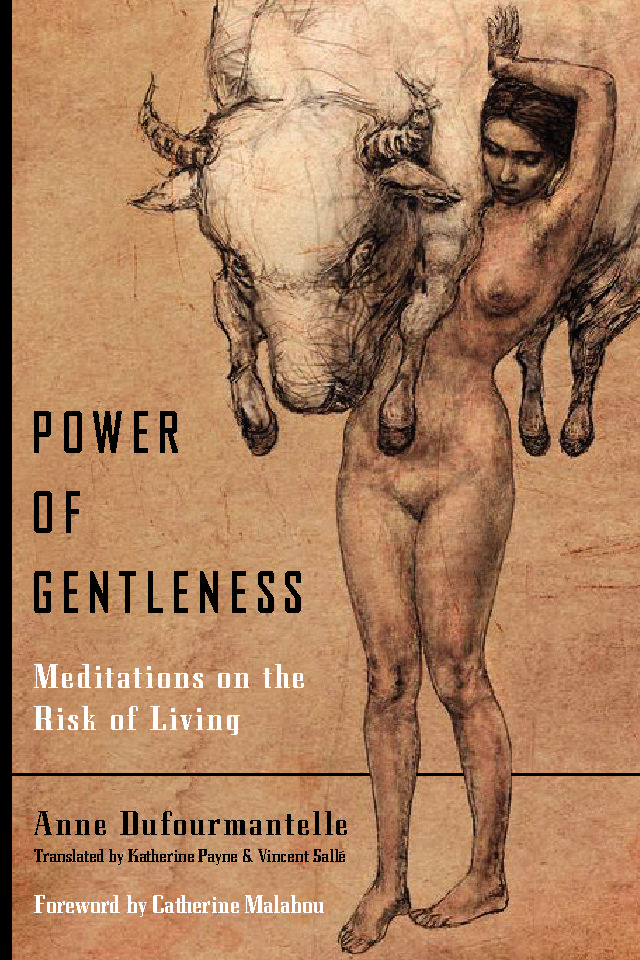Power of Gentleness: Meditations on the Risk of Living
By Anne Dufourmantelle
Translated by Katherine Payne & Vincent Sallé
Published by Fordham University Press
Purchase your copy here or here.
Introduction
Gentleness is an enigma. Taken up in a double movement of welcoming and giving, it appears on the threshold of passages signed off by birth and death. Because it has its degrees of intensity, because it is a symbolic force, and because it has a transformative ability over things and beings, it is a power.
A person, a stone, a thought, a gesture, a color . . . can demonstrate gentleness. How do we approach such singularity? Approaching it is risky for those who want to comprehend it. In many ways it has the fierce nobility of a wild beast. The same could be said of a few other rare species: innocence, courage, astonishment, vulnerability. Existing in the margin of concepts patrolled by the grand history of thought, they are watched by philosophy with an anxious eye. They require an unprecedented flexibility because they do not let themselves be defined only in terms of value, nor do they let themselves be contained in the description of their phenomenon.
We might limit ourselves to situating gentleness on a sensitivity frequency, recording the magnitude. But the intention behind it then disappears, reducing it merely to a kind of mood. Who senses “the gentleness” of an act, of a thought, of an object? Its recipient? The one who grants it? Does it occur without witness or author? Calm, delight, tact are spiritual benefits as well as physical. This is one of the many paradoxes of the concept that seems to float in the spheres of the ideal: it manifests its power only because it is also profoundly sensual.
Gentleness incites violence because it doesn’t offer any possible foothold on authority. Dostoyevsky, Melville, Hugo, Flaubert, or the Tolstoy of “Master and Man” portray it as the elusive force that opposes injustice. So much so that those who embody gentleness are condemned in the eyes of society. From Prince Myshkin to the vagrants of Hamsun, those called the innocents do not know they carry a gentleness that destines them to wandering and loneliness. Its contiguity with goodness and beauty makes it dangerous to a society that is never more threatened than when there exists a relationship between an individual and the absolute.
In the symbolic order as in certain martial arts, gentleness can drive back and defeat evil better than any other response. Nothing can force it or commit others to it. In our day, gentleness is sold to us under its related form of diluted mawkishness. By infantilizing it our era denies it. This is how we try to overcome the high demands of its subtlety—no longer by fighting it, but by enfeebling it. Language itself is therefore perverted: what our society intends for the human beings that it crushes “gently,” it does in the name of the highest values: happiness, truth, security.
If love and joy have essential affinities with gentleness, is it because childhood holds the enigma? Gentleness shares with childhood a kind of natural community but also a power. It is the secret lining, or where the imaginary joins the real in a space that contains its own secret, making us feel an astonishment from which we can never entirely return.
Origins
Life places gentleness within us originally. We think to grasp it from the source—a child sleeping soundly with a taste of its mother’s breast milk, and voices that soothe, chant, caress—we guess it to be elsewhere, in the movement of an animal, the rise of darkness in the summer, the truce of a battle, the meeting of a gaze. We recognize it from the bedside of the dying, their gaze that calmly passes through their feverless agony, but even there it won’t let itself be grasped. It comes to calm the fever of lovers and to oppose the executioner with a final breath, against which he can do nothing.
We perform acts of gentleness. We demonstrate gentleness. We soften the end of a life, its beginning. Gentleness is an enigma in its simplicity. It does not go without recognition for its own obviousness. As giver and receiver, it belongs just as much to touch as to thought.
Is it originally a quality of being? An experience? An ethic? A lie? Is there a primitive sensoriality that might have located gentleness one day?
Coming from further than living memory, there where mother and child are one, bodies merged, gentleness evokes a lost paradise. An original before that might be a dawn. But from the beginning there will already have been violence, terror, murder. Mimicry and competition that enflame hatred; no speech without betrayal and no civilization without an appeal to the most refined cruelty. Paradise is always already lost as it is measured against the origin, and this observation does not belong only to the melancholy. Living is a conquest wrenched from this passion of loss, a passion that is also an illusion reminiscent of epics, narratives, myths. We must have the courage not to consent to this lost paradise because it is a terrible mistake, it will open the door to all future resentments. It will justify the sacrifice.
Gentleness also comes after the separation and the searing pain of that first breath, after the hunger, after the anxiety, after the cry.
Disturbing, pacifying, dangerous, it appears on the edge. On the other side, once across the threshold. Of empty, of full, of space, of time, of heaven, of earth, it intrudes between signs, between life and death, between the beginning and the end. Indistinguishable from the range of feelings it accompanies—kindness, protection, compassion. It is bordered because it offers itself as a passage. In diffusing itself it alters. In indulging itself it metamorphoses. It opens in time a quality of presence within the tangible world.
Gentleness invents an expanded present. We talk about gentleness, acknowledging it, delivering it, collecting it, hoping for it. It is the name of an emotion of which we have lost the name, coming from a time when humanity was not dissociated from the elements, from animals, from light, from spirits. At what point did the human race become aware of it? What was gentleness opposed to when life and survival were merged?

